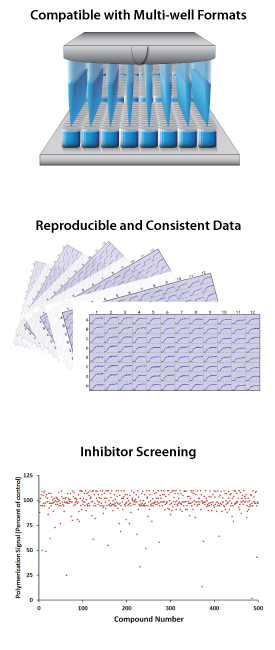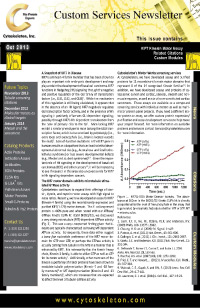KIF7 Kinesin Motor Assay
A Snapshot of KIF7 in Disease
KIF7 is a Kinesin-4 family member that has been shown to play an important role in embryonic development and may play a role in the development of basal cell carcinomas. KIF7 functions in Hedgehog (Hh) signaling through the negative and positive regulation of the GLI family of transcription factors (i.e., GLI1, GLI2, and GLI3)1. While the mechanism of this regulation is still being elucidated, it appears that in the absence of an Hh ligand, KIF7 negatively regulates GLI transcription factor activity, and in the presence of Hh signaling it positively influences GLI dependent signaling; possibly through KIF7’s Hh-dependent translocation from the base of primary cilia to the tip1. Mice lacking KIF7 exhibit a similar phenotype to mice lacking the GLI3 transcription factor, which is characterized by polydactyly (i.e., extra toes) and exencephaly (i.e., brain is located outside the skull)2. Loss-of-function mutations in the KIF7 gene in humans results in ciliopathies that can lead to lethal developmental abnormalities (e.g., Acrocallosal and fetal hydrolethalus syndrome) or less severe developmental defects (e.g., Meckel and Joubert syndromes)3,4. Given the important role of Hh signaling in the development of basal cell carcinomas (BCC) and other cancers5, it will be interesting to see if research in this area also uncovers a role for KIF7 in Hh signaling-dependent cancers.
The Kif7 Motor Domain Exhibits Microtubule-Stimulated GTPase Activity
Cytoskeleton continues to expand their offerings of kinesin, dynein, and myosin motor assays with high signal to noise ratios. Recently, we have developed an assay for KIF7 (Kinesin-4 family) using the recombinantly expressed and purified KIF7(1-370) motor domain. This E. coli-expressed protein is >80% pure and when tested with our ATPase/GTPase Kinetic ELIPA Kit (Cat# BK051/52), we discovered a very strong microtubule (MT)-dependent GTPase activity (Fig. 1). This was a very unexpected finding given that kinesins are typically characterized as having MT-dependent ATPase activity. Consequently, these data either suggest a bona fide nucleotide preference of the KIF7 motor domain for GTP over ATP, or perhaps the GTPase activity is actually coming from tubulin in the MTs in a manner that is enhanced by KIF7. It is noteworthy that the kinesin heavy chain, Kinesin-1 family, is able to utilize GTP as well as ATP for its motor activity6. Additionally, other members of the Kinesin superfamily of motor proteins have been shown to modulate tubulin polymerization (Kinesin-7 and -10 family members)7 or MT depolymerization (Kinesin-8 and -13 family members)8, which are processes that are expected to affect the level of tubulin GTPase activity.
Cytoskeleton’s Motor Werks Screening Services
At Cytoskeleton, we have developed assays and purified proteins for 11 recombinant Kinesin motor domains that represent 8 of the 14 recognized Kinesin families9. In addition, we have developed assays and proteins of cytoplasmic dynein and cardiac, skeletal, smooth, and non-muscle myosins, as well as an in vitro re-constituted cardiac sarcomere. These assays are available as a compound screening service with individual motors as well as multi-motor protein panel projects. If you need a different motor protein or assay, we offer custom protein expression/purification and assay development services to help move your project forward. For more information on available proteins and services, contact tservice@cytoskeleton.com for more information.

Figure 1: Figure 1. KIF7(1-370) Motor Domain Activity. The absorbance at 360 nm in the BK051/52 Kinetic ELIPA kit is directly proportional to the level of free phosphate in the assay that is generated by enzymatic hydrolysis of either ATP or GTP. MT = microtubules.
References
- Liem K.F. Jr., He M., Ocbina P.J.R., and Anderson K.V. 2009. Proc. Natl. Acad. Sci. U.S.A. 106, 13377-13382.
- Cheung H.O. et al. 2009. Sci. Signal. 1:ra29.
- Putoux A. et al. 2011. Nat. Genet. 43, 601-606.
- Dafinger C. et al. 2011. J. Clin. Invest. 121, 2662-2667.
- Goetz S.C. and Anderson K.V. 2010. Nat. Rev. Genet. 11,331-344.
- Paschal H.S. et al. 1987. J. Cell Biol. 105, 1273-1282.
- Friel C.T. and Howard J. 2012. J. Muscle Res. Cell. Motil. 33, 377-383.
- Walczak C.E., Gayek S., and Ohi R. 2013. Annu. Rev. Cell Dev. Biol. 29, 417-441.
- Lawrence, C.J. et al. 2004. J. Cell Biol. 167, 19-22.
About Custom Services
Cytoskeleton, Inc. has been a reliable source of compound screening services in the areas of pre-clinical drug development programs and early compound screening in primary HTS projects, as well as secondary screening and compound target validation. We also have extensive experience in gene design and expression with an eye for producing highly purified biological active proteins. Our expertise in protein purification is the basis for the complementary skill of assay design. We have produced many functional assays for kinesins (e.g., Eg5, CenPE, MKLP2), dynein [cytoplasmic]), myosins (e.g., cardiac, smooth, skeletal, and non-muscle isoforms), small G-proteins (e.g., Rho, Arf, Ral families), tubulins (e.g., tumor, plant, and fungal origins), and actin binding proteins; many of them are multi-protein assays that might have protein complexes of 3 or more subunits, e.g., a soluble sarcomere format and the Arp2/3 complex based assay. Our experiences in antibody and ELISA technology complements the cytoskeletal and signal transduction focus. We support all of our services with a dedicated technical services department and years of laboratory experience in the fields of cell biology, cancer biology, and neuroscience.
p>For more details on these four main areas click on one of the following:
Compound Screening and Drug Development
ELISA and antibody development
If you have an immediate question please send an e-mail describing your requirements to tservice@cytoskeleton.com.
Have questions? Email tservice@cytoskeleton.com or call (303) 322-2254.
Exceptional and Dedicated Technical Support:
- 40+ years of combined experience
- Expertise in: Protein biochemistry, cell biology, cancer biology, and neuroscience
Product and Service Performance:
- Modules with clearly defined deliverables
- Activity tested to specification
- Shipped in desiccated chambers & guaranteed for one year
- Proven results (See citation tab above for examples)
- Satisfied clients (See examples below)
Current Clients Include:
- Merck & Co., Inc.
- Eli Lilly & Co.
- Amgen, Inc.
- Abbott Laboratories
- Pfizer, Inc.
- Astra-Zeneca plc
- GlaxoSmithKline plc
- Genentech, Inc.
- Johnson & Johnson
- Bristol-Myers Squibb


